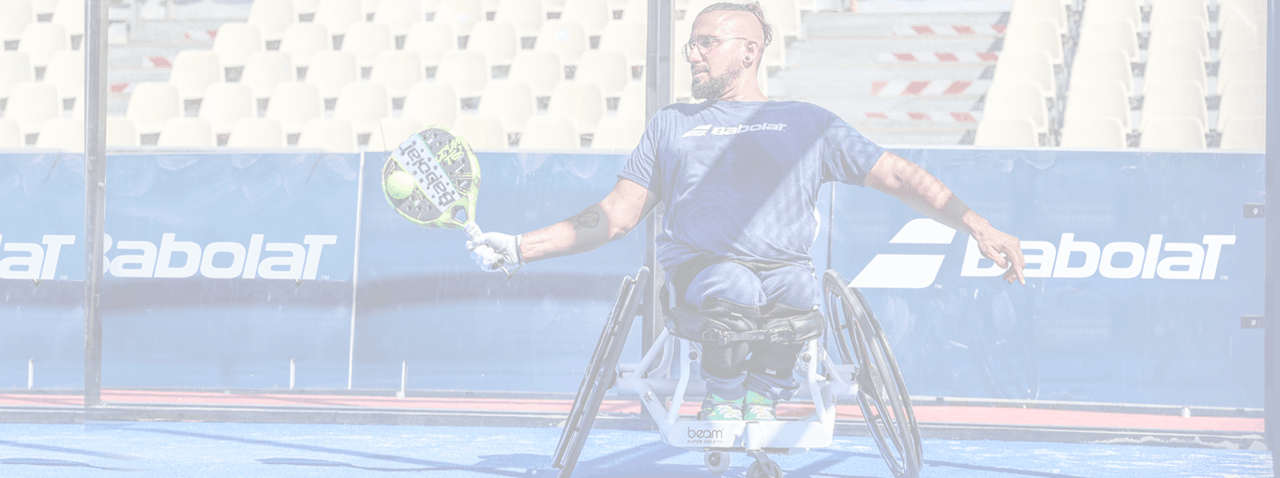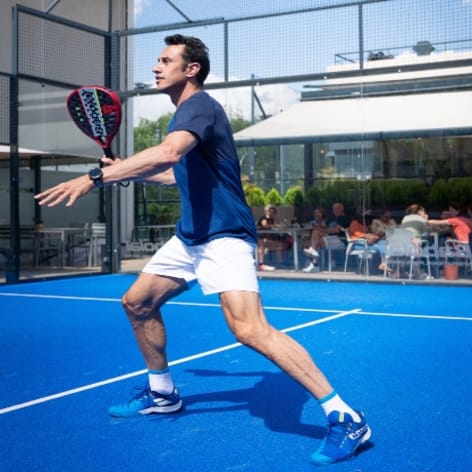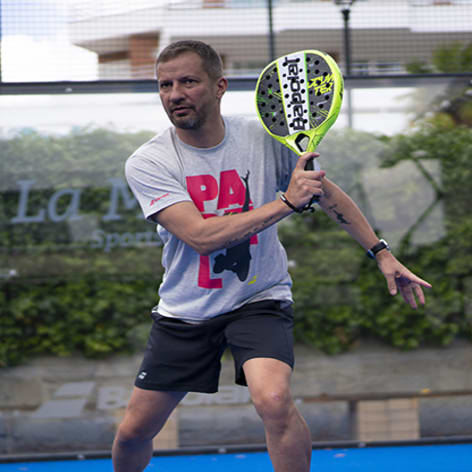The person who became Babolat’s first high-performance para-athlete was always going to be ambitious, hard-working and determined – but the man who earned the accolade is also an eminently likeable man who goes solely by his nickname: Monty.
A quick talker with a gentle laugh, Monty leads conversations in such wonderful directions that it would be hard not find a relatable topic from his life experiences. Starting from his love for padel, which he plays in a wheelchair, through getting to number 1 in Cataluña after only two years in the sport, and becoming the first Babolat signed Padel para-athlete, a deal that even Monty himself describes as unusual, but essential on the road towards inclusivity in sports.
“Babolat normally focuses on nurturing ‘young promise’,” he says, “but I am 36 years old. Nevertheless, I think I am promising too, because clearly a promise is something that hasn’t happened yet. It needs hard work to make it happen. So every person who has a future is a young promise, you know?”
‘You can choose the family you live with’
Discriminating on age would not achieve anything in the para-sport movement, reflects Monty. And this came up when he first talked with Babolat Trade Marketing Manager. Monty impressed on Babolat Team, that what mattered was not what age he was but what he could still achieve, and soon the company agreed to support him. But it was important for Monty to be a Babolat ambassador on merit, not as a token: “Some brands sponsor para-athletes just to have some charity work on the side,” he says. “That’s not my experience with Babolat: I quickly became part of the family, as they call it.”
Another family phrase opens a door into Monty’s past: “You don’t get to choose the family you are born into, but you can choose the family you want to live with.”
He has lived in a wheelchair all his life because of a bone marrow tumour diagnosed when he was three months old. When he was three years old, his family moved from Madrid to Barcelona and soon left him to an orphanage due to economic hardship. He lived there until the age of 16. That was when he encountered tennis for the first time.
This love-at-first-sight for racquet and ball has lasted for 20 years, through many memories of success as an athlete and seven years as a Catalan Federation trainer for players with disabilities. His experience has given him an insight into the complexity of para-sport: “A fellow athlete in a wheelchair once told me he really missed going back home tired and immediately jumping on his bed, that sensation of abandoning all your weight and letting yourself fall. I never had that, but I went through other experiences.”
His tennis career was marked by the high expectations he had of himself, in sport as in life. The happiness of winning tournaments was all but washed out within the two weeks of recovery time he needed, as he often suffered severe nervous breakdowns.
‘Padel made me a different person’
Switching to Padel erased all these bad feelings almost magically. How? By sharing his side of the court with another person and all that entails. It pushed him to create good vibes with every player he met, just in case he might end up playing alongside them. “It makes the experience less competitive and more enjoyable,” he says, “to the point that I believe padel made me a different person.”
He even chose a different name to go with his new life. “I prefer to be known as just Monty – with a ‘y’, not an ‘I’,” he says. Monty is a nickname based on his official name, but he’s not keen to use the official name. “When I started playing tennis my nickname was ‘Peque’ [little one], but it is about time I grow-up, right, so now I’m Monty?” and with this he cracks into laughter.
Monty doesn’t like to talk much about the obstacles a wheelchair-bound person has to overcome to play padel, or any other sport for that matter, because all that inspirational rhetoric around people with disabilities bores him. “Listen, my disability is very visible,” he says, “but perhaps you don’t see the disabilities of other people. Maybe someone with mental health problems. Maybe guys who have heavy jobs or who get into arguments with their families. Anyone can make huge sacrifices to show up, more than I do.
“In fact, I don’t like to be admired simply because I play padel, I’d like to be admired because I am a good player.” A perfect sentiment to go with Babolat’s first para-athlete.





